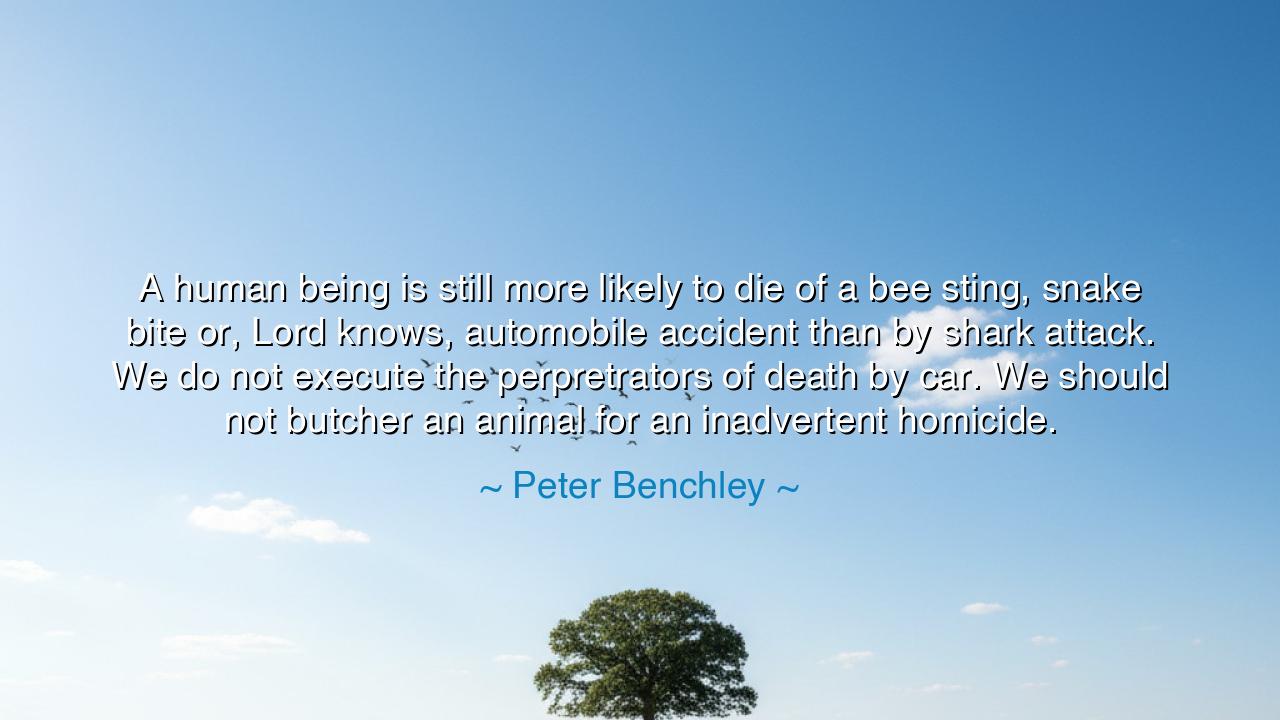
A human being is still more likely to die of a bee sting, snake
A human being is still more likely to die of a bee sting, snake bite or, Lord knows, automobile accident than by shark attack. We do not execute the perpretrators of death by car. We should not butcher an animal for an inadvertent homicide.






"A human being is still more likely to die of a bee sting, snake bite or, Lord knows, automobile accident than by shark attack. We do not execute the perpetrators of death by car. We should not butcher an animal for an inadvertent homicide." Thus spoke Peter Benchley, the man who gave birth to the great white terror of the seas through his novel Jaws, yet who, in the wisdom of later years, became one of the fiercest defenders of the creature he had once made infamous. His words are not merely an appeal for mercy toward the shark; they are a meditation upon fear, ignorance, and justice, and upon the folly of mankind when it punishes the innocent to soothe its own unease.
When Benchley wrote Jaws in 1974, the world’s oceans became the theater of our collective dread. The shark, once a symbol of power and mystery, was transformed into a monster of myth—a devourer of men. After the film’s release, panic swept the shores; fishermen hunted sharks with zeal, tournaments were held to slay them by the hundreds, and the sea itself seemed to echo humanity’s vengeance. Yet in time, the creator of this legend saw the truth that he had awakened fear, not knowledge. His quote comes from this awakening—from the voice of a man who had looked into the eyes of the creature he once condemned and found not evil, but innocence misunderstood.
For his words speak of proportion and justice. He reminds us that death by shark is a rarity, a whisper in the roaring chaos of human peril. More people perish beneath wheels of steel or beneath the hum of bees than ever fall to the jaws of the deep. Yet we raise no crusades against the bee or the driver. Why, then, do we slay the shark for a crime of instinct? The animal does not murder; it merely acts as it was created to act, as all creatures do—following the ancient law of hunger and survival. To butcher it for an inadvertent act is to misunderstand both nature and ourselves. It is to take vengeance upon the mirror that shows us our own fear of death.
In ancient times, when storms struck or crops failed, mankind offered sacrifices to appease the gods of the earth and sea. We blamed the heavens for our suffering because we could not face the uncertainty of life. So too now, when a shark kills, we turn the creature into a demon—because it is easier to hate than to understand, easier to destroy than to accept our own frailty in the vastness of nature. Benchley’s wisdom calls us to abandon such superstition, to replace vengeance with reverence, and punishment with perspective.
Consider the fate of the wolf in Europe, once hunted to near extinction for preying upon livestock. Feared and hated, it was wiped from the wilds that had been its home for millennia. Only when the forests grew silent and the deer multiplied unchecked did men realize that in destroying the predator, they had unbalanced the world. The same truth echoes in the oceans: when we kill the shark, we weaken the sea itself, for it is the guardian of its balance. Benchley, who spent his later life speaking for conservation, understood that to destroy what we fear is to wound the earth that sustains us.
The deeper meaning of his quote lies not only in ecology but in human morality. It asks us to reconsider our impulse toward retribution—to see that true justice does not strike blindly, but with wisdom and restraint. We must learn to distinguish between malice and misfortune, between the act of nature and the act of evil. For to kill an animal for doing what it was born to do is to place ourselves above nature, as judges over creation, rather than its stewards. The ancient duty of humankind is not domination but harmony—to walk humbly among the living things of the world, not as masters, but as kin.
Thus, the lesson of Peter Benchley’s words is both simple and profound: do not destroy what you fear; understand it. Let knowledge conquer terror, and compassion temper power. When danger comes, do not seek vengeance against the natural order, but wisdom in how to live within it. For the sea, the land, and all creatures within them are not our enemies; they are the body of life itself, of which we are but a fleeting part.
And so, when next you look upon the dark waves or hear the whisper of a creature that stirs unease within you, remember this teaching: the shark, the wolf, the serpent—all play their roles in the vast symphony of existence. To punish them for being what they are is to sin against the balance of creation. Instead, let us walk the path of understanding, and leave behind the ancient folly of fear. In this way, as Benchley himself came to see, we honor both the sea and the soul—preserving the majesty of life that surrounds us, and the dignity that lies within our own hearts.






AAdministratorAdministrator
Welcome, honored guests. Please leave a comment, we will respond soon